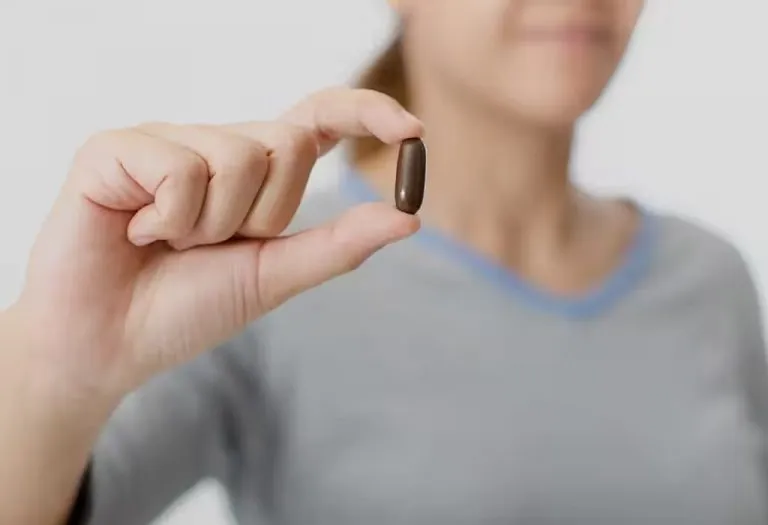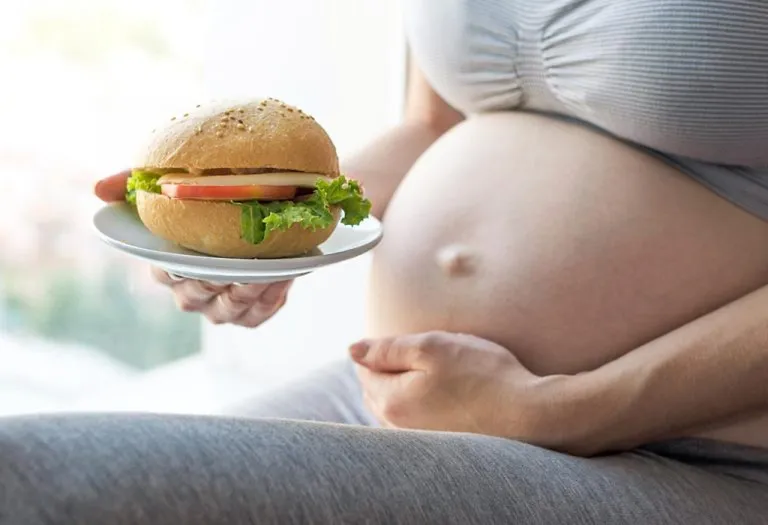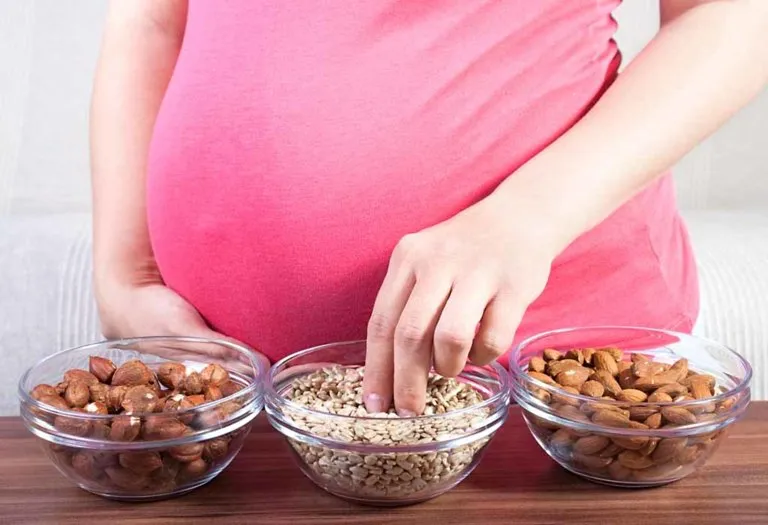Taking Vitamin B3 (Niacin) During Pregnancy – Importance, Food Sources and Dosage

- What Is Niacin?
- Importance of Vitamin B3 in Pregnancy
- Recommended Daily Intake for Pregnant Women
- Niacin Deficiency
- Food Sources of Vitamin B3
- FAQs
Proper nutrition during pregnancy is vital for the healthy growth and development of the unborn baby. Vitamin B3, also known as niacin, is one such essential nutrient that is critical in maintaining overall health, particularly during pregnancy. This vitamin supports various physiological functions, including energy production, DNA repair, and cell signalling, which are vital for both the mother and the developing fetus. Ensuring adequate intake of niacin during pregnancy can help prevent complications and promote healthy fetal development. Keep reading to learn more about the benefits of Vitamin B3 during pregnancy, the best food sources of vitamin B3, and how to ensure you are getting the right amount for a healthy pregnancy.
What Is Niacin?
Niacin, or nicotinic acid, is Vitamin B3, a water-soluble chemical essential human nutrient. Vitamin B3 is also found in another form called nicotinamide. Both forms of Vitamin B3 are vital for human life. Vitamin B3 is converted to NAD (nicotinamide adenine dinucleotide), which is necessary for metabolising fat, carbohydrates, protein, and alcohol in the body to give us energy. Vitamin B3 is also necessary for DNA repair, cell signalling, and synthesis of fatty acids (2).
Importance of Vitamin B3 in Pregnancy
Vitamin B3 is an essential nutrient required for pregnant women so that the foetus is well-nourished and develops properly. Here are some reasons why Vitamin B3 is important for pregnant women:
1. Prevents Birth Defects
Research shows that flaws in the genes that produce NAD cause birth defects in babies. Hence, taking adequate vitamin B3 can prevent certain birth defects and complications.
2. Essential for the Development of Baby’s Brain
Niacin is necessary for the healthy development of the baby’s brain and nervous system.
3. Prevents Miscarriages
If the developing foetus has abnormalities, miscarriage can occur. Hence, taking Vitamin B3 can also prevent miscarriages.
4. Gives Us Energy
Vitamin B3 plays a crucial role in the metabolism of fats, proteins, carbohydrates, and alcohol, giving our body the energy it requires.
5. Keeps Skin and Other Organs Healthy
Taking vitamin B3 is necessary for healthy skin, nervous system, and mucous membranes (6).
6. Reduces Nausea and Improves Digestion
Taking vitamin B3 has been found to reduce morning sickness and aid in digestion.
7. Reduces Migraines
Vitamin B3 has been found to reduce migraines.

Recommended Daily Intake for Pregnant Women
The recommended dietary allowance (RDA) of niacin when pregnant is 18 mg daily, with an upper limit of 35 mg per day. Any amount between 18 and 35 mg is acceptable, but more than 35 mg per day is not recommended (1).
Niacin Deficiency
Niacin, or vitamin B3 deficiency, is rare these days as most foods and grains are fortified with vitamin B3. However, the deficiency of Vitamin B3 can cause a severe disease called Pellagra, characterised by symptoms like lesions on the body, butterfly-shaped lesions on the face, lesions around the neck, pain and swelling of the mouth, vagina, and urethra, diarrhoea, vomiting, depression, and dementia. Signs of vitamin B3 deficiency are (3):
- Redness and irritation of the skin
- Headaches
- Digestive problems
- Depression and mood swings
- Inability to focus
- Dizziness
- Fatigue and poor circulation
Some people are at a higher risk of vitamin B3 deficiency (5):
- People who consume corn or sorghum as a staple diet
- Alcoholics
- People with poor diets or those suffering from malnutrition
- People with slow-growing tumours
Food Sources of Vitamin B3
The various food sources that contain Vitamin B3 (Niacin) are (7):
- 113 g chicken breast – 14.4 mg of niacin
- 113 g salmon – 11.3 g niacin
- 113 g tuna – 5 g niacin
- 133 g turkey – 5 mg niacin
- 142 g mushrooms – 5.4 mg niacin
- 113 g lamb – 7.8 g niacin
Niacin is also found in green peas, peanuts, beef, sunflower seeds, avocado, asparagus, liver, broccoli, and veal.
FAQs
1. Can you take vitamin B3 supplements while pregnant?
If you are wondering, is niacin safe during pregnancy, the answer is yes. Niacin is safe if taken within the RDA of 18 to 35 mg daily. Any amount between 18 and 35 mg is acceptable. However, more than 35 mg per day is not recommended for pregnant women.
2. What happens if you take too much vitamin B3 in pregnancy?
Niacin and pregnancy are interlinked, as niacin is essential for properly developing the baby’s brain. However, taking too much vitamin B3 can cause side effects like skin flushes and liver damage (4).
3. Are there any interactions between niacin and other prenatal vitamins?
Niacin generally works well with other prenatal vitamins, as they collectively support maternal and fetal health. However, high doses of niacin can sometimes interfere with the absorption or effectiveness of other vitamins and minerals. It is essential to follow a doctor’s guidance when taking multiple supplements to ensure a balanced intake without adverse interactions.
4. How can vegetarians or vegans ensure they get enough niacin during pregnancy?
Vegetarians and vegans can still meet their niacin needs through plant-based sources. Foods such as peanuts, sunflower seeds, brown rice, mushrooms, green peas, and avocados are excellent sources of niacin. Additionally, fortified cereals and plant-based milk can help boost niacin intake.
Vitamin B3 and pregnancy go hand in hand, as adequate intake of this essential nutrient supports pregnant women to ensure the healthy development of the unborn baby. However, talk to your obstetrician before taking vitamin B3 supplements. The doctor will decide if you require it and will recommend a dosage that is suitable for you.
References/Resources:
1. Niacin; National Institutes of Health; https://ods.od.nih.gov/factsheets/Niacin-HealthProfessional/
2. Vitamin B3 (Niacin); Mount Sinai; https://www.mountsinai.org/health-library/supplement/vitamin-b3-niacin
3. Niacin – Vitamin B3; Harvard T. H. Chan School of Public Health; https://nutritionsource.hsph.harvard.edu/niacin-vitamin-b3/
4. Niacin; University of Rochester Medical Center; https://www.urmc.rochester.edu/encyclopedia/content.aspx?contenttypeid=19&contentid=VitaminB-3
5. Redzic. S; Hashmi. M. F, Gupta.V; Niacin Deficiency; National Institutes of Health; https://www.ncbi.nlm.nih.gov/books/NBK557728/#
6. Arakelyan. H. S; Vitamin B3 (Niacin), Health Benefits, Side Effects and Interactions; ResearchGate; https://www.researchgate.net/publication/350192762_Vitamin_B3_Niacin_Health_Benefits_Side_Effects_and_Interactions
7. Niacin: foods, functions, how much do you need & more; European Food Information Council; https://www.eufic.org/en/vitamins-and-minerals/article/niacin-foods-functions-how-much-do-you-need-more
Also Read:
Vitamin C in Pregnancy
Vitamin A when Pregnant
Taking Vitamin E while Pregnant
Vitamin B2 (Riboflavin) during Pregnancy
Is It Safe to Take Vitamin B6 in Pregnancy Diet?
Was This Article Helpful?
Parenting is a huge responsibility, for you as a caregiver, but also for us as a parenting content platform. We understand that and take our responsibility of creating credible content seriously. FirstCry Parenting articles are written and published only after extensive research using factually sound references to deliver quality content that is accurate, validated by experts, and completely reliable. To understand how we go about creating content that is credible, read our editorial policy here.




































